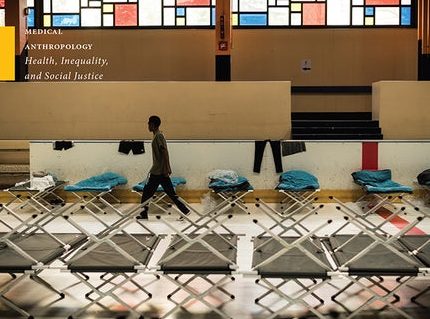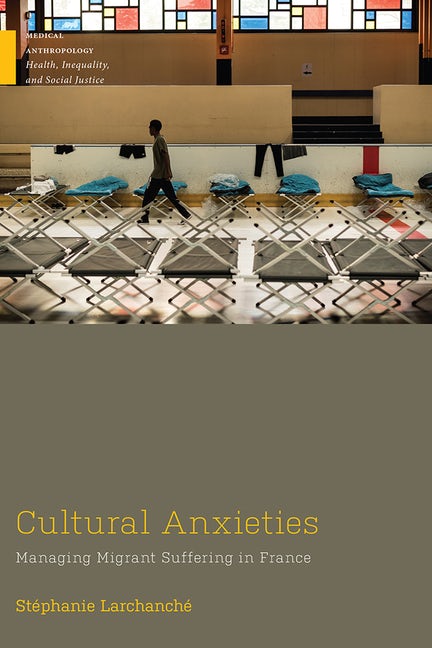

This is part of our special feature, Networks of Solidarity During Crisis.
We all rely on stereotypes, but as professionals in the transcultural clinic, we have the responsibility to identify them, so as not to let them imbue our understanding of clinical situations. The stereotype self-imposes; the therapist disposes.
—Dr. B., supervising psychiatrist at Centre Minkowska[1]
To identify and “dispose” of one’s inclinations to stereotype: this is the reigning ethos of Centre Minkowska in Paris, the specialized mental health clinic at the center of Stéphanie Larchanché’s important new ethnography, Cultural Anxieties: Managing Migrant Suffering in France (Rutgers University Press, 2020). Larchanché approaches her research site from a novel and intriguing standpoint: she arrived as an ethnographer of the clinic, was hired as a staff member, and is now a clinic psychotherapist as well. As a medical anthropologist, educator, and clinician straddling multiple disciplines and professional realms, she is thus uniquely positioned to analyze the center’s mandate and mission and distill valuable lessons for readers in the social sciences, health policy, and clinical fields in France and far beyond.
Cultural Anxieties provides rich food for thought on a range of topics, but its greatest contribution lies in the book’s nuanced analysis of the distinctive approach to “cultural competence” undergirding Centre Minkowska’s work. One key point must vigorously be underscored from the outset. The center’s deeply reflexive and politically engaged approach to cultural competence contrasts sharply with other approaches carrying the same name—especially on the other side of the Atlantic, where cultural competence was abandoned nearly a decade ago by anthropologists and fellow travelers who saw it as outdated, politically flaccid, and potentially damaging to clinical rapport, or even to patients themselves (see, e.g., Kleinman and Benson 2006; Jenks 2011; Good et al. 2011; Carpenter-Song and Willen 2013).
None of these critiques applies to Centre Minkowska’s approach to cultural competence, which is distinguished, above all, by one hallmark feature: the notion of active and perpetual efforts to “decenter.” Decentering, Larchanché explains, is “a work of posture” involving the cultivation of “an ability to step back from one’s representations and, at times, from one’s emotions related to the judgment (often negative) of things foreign or unknown” (21). Learning to “decenter” thus requires unlearning layer upon layer of professional, institutional, and biographically accumulated common sense.
At Centre Minkowska, cultural competence does not involve using specialized “cultural” knowledge to resolve clinical misunderstandings. Rather, it involves the hard work of learning to recognize how racialization and prejudice, including racializing and prejudicial actions by one’s own professional colleagues, can impede the provision of meaningful treatment and adequate care. The hard work of decentering—rooted in a keen awareness of migrants’ precarity and suffering; in the recognition of myriad, often upsetting forms of uncertainty; and in the difficult, ongoing work of critical self-reflection and engagement with counter-transference—lies at the core of the center’s mission.
The primary locus of this ongoing work, and the empirical focus of the book, is MEDIACOR (MEDIation, ACcueil, ORientation), the clinic’s referral unit, which constitutes “the absolute pulse of the institution and the site of both the production and enactment of its expertise” (ibid). Larchanché trains her ethnographic gaze on two interacting groups of “border people,” a term she borrows from Michel Agier (2016): precarious migrants to Paris and its environs and, to an even greater extent, the independent-minded French mental health care providers who have become her colleagues.
Early in the book, readers are treated to a quick but vital historical overview of the clinic itself. Centre Minkowska, presently located in Paris’ 17th arrondissement, was founded by psychiatrists Eugene Minkowski and Francoise Minkowska in the wake of World War II, primarily to serve refugees from Eastern Europe. In its early decades, the clinic’s consultation service offered care in patients’ native languages of German, Russian, and Polish, and later in Portuguese and Hungarian as well. The clinic continued to evolve in response to shifting patterns of immigration, but remained committed to its founding clinical paradigm: a person-centered, phenomenological focus developed by Minkowski along with Swiss psychiatrist Ludwig Binswanger, and informed by the work of both Husserl and Bergson. Significantly, their approach “focused on the person’s lived experience rather than searching for symptoms of mental distress” (58). Major institutional shifts took place in the 1980s and 1990s, first when the clinic joined the French public hospital system, and later as clinic staff tested out and adapted different approaches to cross-/inter-/transcultural mental health care with origins in France and in North America. Since its establishment in the post-War period, Centre Minkowska has thus been steeped in the tensions, uncertainties and anxieties that proliferate in border spaces and cluster around “border people.” At present, both the clinic in general and MEDIACOR in particular inhabit an even messier borderland—not only between clinicians and patients, the center and other institutions (hospitals and clinics, social welfare offices, schools), and people with and without migration backgrounds (including clinicians), but also between two bustling, and at times internally contentious, fields of scholarship and clinical practice: medical anthropology, on one hand, and the (partially, and slowly) decolonizing field of French psychiatry, on the other.
The book deftly introduces readers to the complex histories of each field as well as key intersections between them. We learn how fibers of colonialist logic continue to thread stubbornly through the fabric of contemporary French psychiatry, especially in the treatment of patients who were born, or whose parents were born, beyond France’s borders. We learn how French republicanism can make certain forms of difference—cultural, religious, and especially racialized difference—quite literally unspeakable, and unmeasurable, in ways that can harm health. We learn how shifts in political attitude toward different migrant groups have reverberating effects on budgets, institutional dispositions, and the legal, material, social, and experiential realities of migrants’ lives.
Readers also learn how a wave of interest in one problematic mode of ethnopsychiatric practice—the culturalist approach touted by controversial psychiatrist Tobie Nathan—pushed Centre Minkowska, in the 1990s, to sharpen and universalize its own approach in ways that lay the groundwork for today’s emphasis on “decentering.” Contra Nathan, center staff asserted in a 1996 letter to Le Monde that, “We are not held up as experts simply on the basis that we speak the same language or that we are from the same culture. We are not even sure that one individual may ever be from the same culture as another” (59). Larchanché shows how this assertion, which may at first sound perplexing, especially from a clinic that purportedly offers “transcultural” expertise—is fundamentally about training clinicians:
To take a step back … from their clinical activities and constantly reformulate their professional goals and ethics in relation to the center’s overarching mission of integrating migrants through health care (30).
This mandate is, in effect, a product of clinic staff’s deep engagement with the divided and evolving field of medical anthropology. Larchanché charts parallel and competing traditions within the field—especially the traditions of clinical medical anthropology and critical medical anthropology—and shows how the work of Centre Minkowska proves earlier assertions of their mutual incompatibility to be both false and unhelpful. Dismissing these claims with the truth of her own professional reality, Larchanché characterizes her own role as the center’s resident anthropologist with clarity, confidence, and a dash of impatience with academic quibbles: “My role … is not limited to that of a cultural interpreter, nor is it ambiguous” (177).
The MEDIACOR unit, as the primary location of this work, emerges in the book as a fraught and fascinating space of encounter among mental health clinicians of different ages, professions, and personal backgrounds. It is a small and friendly environment, but also a nexus of multiple and intersecting anxieties that are not only “experienced by the staff at the Centre” but also “reflect broader anxieties of contemporary French society and of global society as well” (4). These anxieties are on full display in the several MEDIACOR team discussions described ethnographically. One such case involves a 50-year old French citizen born in Burkina Faso who was referred to the clinic because, “he expresses his suffering on the register of superstitions and beliefs” (135). Following a lively discussion of the individual’s biography, physical health challenges, marital struggles, and impoverished living conditions, among other factors, supervising psychiatrist Dr. B., poses a tough question to his colleagues:
To what extent did it help us, or hinder us, to know that he was born in Burkina? If you can answer that question, it means that you did an enormous cleansing work against your prejudices in your conscience. … It takes tremendous work on the way we look at the person, so as not to be oneself the victim of reasoning that is useless … It’s not that I don’t see the color, but I don’t see the person through his color. That’s not the same. (138-9).
By grounding and analyzing moments like this one, Cultural Anxieties provides an illuminating window onto a dynamic institution, and evolving field of practice, whose significance could not be greater in the present historical moment, as migrants’ suffering ever more frequently becomes a matter of bureaucratic attention, clinical intervention, and public discussion—not only in France, but around the world. While the author’s triple role as researcher, staff member, and clinician lends tremendous strength to her analysis, one does wish at times for more robust ethnographic engagement with migrant patients themselves, with their larger realities beyond spaces of clinical encounter, and with the longer-term impact of clinicians’ decentering practice on their broader health and life trajectories. Similarly, the book might have engaged more robustly with other modes of transcultural and ethnopsychiatric practice that appear largely in passing, including that of the Centro Frantz Fanon ethnopsychiatric clinic in Torino, Italy, (Giordano 2014) and the cultural consultation model practiced and disseminated by the Transcultural Psychiatry group at McGill University in Montreal, Canada (see, e.g., Kirmayer, Guzder, and Rousseau 2014).
Overall, Cultural Anxieties is a timely, fascinating, and vitally important ethnography that elegantly captures the heart of Centre Minkowska’s ethos as well as its distinct approach to cultural competence. It is essential reading for clinicians and researchers concerned with the complex forms of structural vulnerability that migrants confront; their efforts to achieve health and well-being; the clinical challenges associated with cross- and transcultural care provision; and the uncertainties and anxieties so often generated when human encounters are framed by presumptions of cultural difference rather than awareness of shared human goals, commitments, and dreams. Some readers will come away from the book wishing the team at Centre Minkowska would rename their orientation in order to avoid its confusion with understandings of “cultural competence” that have long since been retired in favor of other traditions, such as cultural humility (Tervalon and Murray-Garcia 1998) and structural competency (Metzl and Hansen 2014). Others, however, will dismiss such linguistic quibbles, glean a rich array of new theoretical and practical insights, and then—like the author herself—roll up their sleeves and get to work.
Sarah S. Willen is Associate Professor of Anthropology at the University of Connecticut, where she also directs the Research Program on Global Health & Human Rights at the Human Rights Institute. A medical and sociocultural anthropologist, her books include Fighting for Dignity: Migrant Lives at Israel’s Margins (University of Pennsylvania Press, 2019), Transnational Migration to Israel in Global Comparative Context (Lexington, 2007), and Shattering Culture: American Medicine Responds to Cultural Diversity (Russell Sage, 2011; with M. DelVecchio Good & colleagues). She is currently Principal Investigator of ARCHES | the AmeRicans’ Conceptions of Health Equity Study, and Co-Founder of the Pandemic Journaling Project.
Cultural Anxieties: Managing Migrant Suffering in France
By Stéphanie Larchanché
Publisher: Rutgers University Press
Paperback / 228 pages / 2020
ISBN: 978-0-8135-9541-2
References:
Agier, Michel. 2016. Les migrants et nous: comprendre Babel. Paris: C.N.R.S. Editions.
Carpenter-Song, Elizabeth, and Sarah S. Willen. 2013. Special Issue: Cultural Competence in Action: Multidisciplinary Perspectives on Four Case Studies. Vol. 37.
Farmer, Paul. 1992. AIDS and Accusation: Haiti and the Geography of Blame. Berkeley: University of California Press.
Giordano, Cristiana. 2014. Migrants in Translation: Caring and the Logics of Difference in Contemporary Italy. Berkeley: University of California Press.
Good, Mary-Jo DelVecchio, Sarah S. Willen, Seth Hannah, Ken Vickery, and Lawrence T. Park. 2011. Shattering Culture: American Medicine Responds to Cultural Diversity. New York: Russell Sage Foundation.
Jenks, Angela. 2011. “From ‘“Lists of Traits”’ to ‘“Open-Mindedness”’: Emerging Issues in Cultural Competence Education.” Culture, Medicine, and Psychiatry 35:209–35.
Kirmayer, Laurence J., Jaswant Guzder, and Cécile Rousseau, eds. 2014. Cultural Consultation: Encountering the Other in Mental Health Care. New York: Springer.
Kleinman, Arthur, and Peter Benson. 2006. “Anthropology in the Clinic: The Problem of Cultural Competency and How to Fix It.” PLoS Medicine 3:e294.
Metzl, Jonathan M., and Helena Hansen. 2014. “Structural Competency: Theorizing a New Medical Engagement with Stigma and Inequality.” Social Science & Medicine 103:126–33.
Tervalon, Melanie, and J. Murray-Garcia. 1998. “Cultural Humility vs. Cultural Competence: A Critical Distinction in Defining Physician Training Outcomes in Multicultural Education.” Journal of Health Care for the Poor and Underserved 9:117–25.
[1] Cited in (Larchanché 2020: 138-9).
Published on October 13, 2020.




